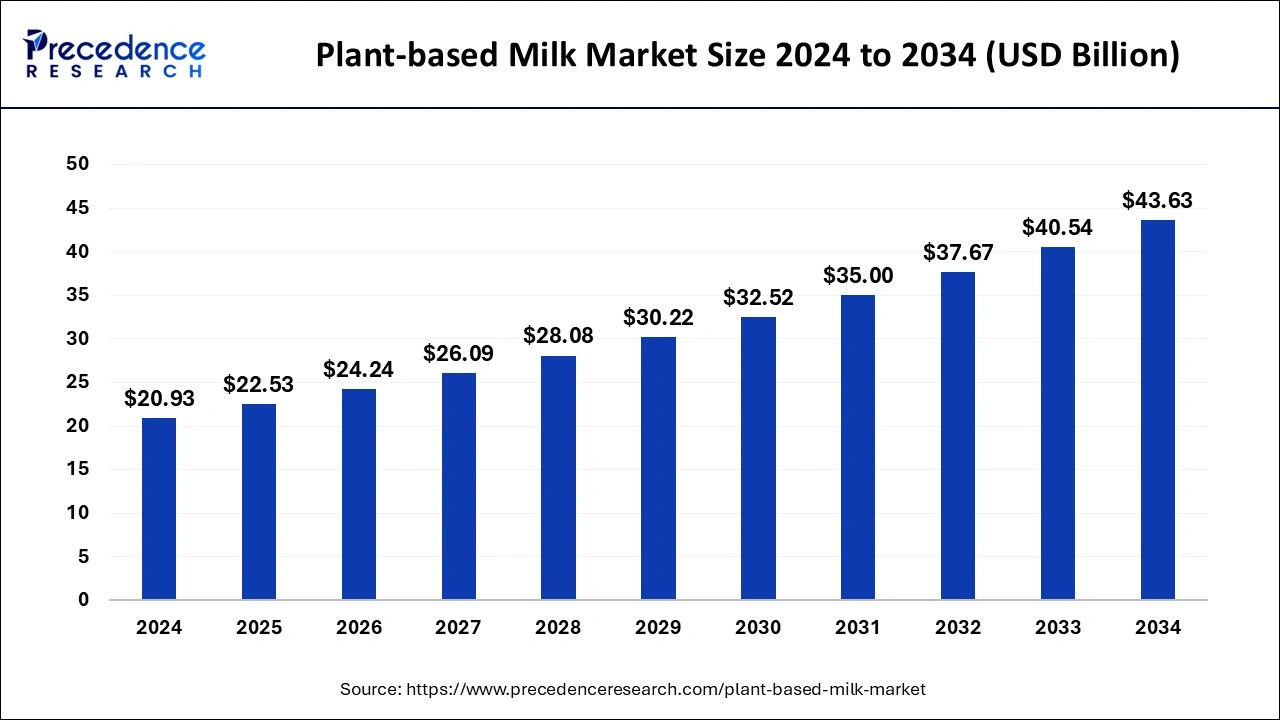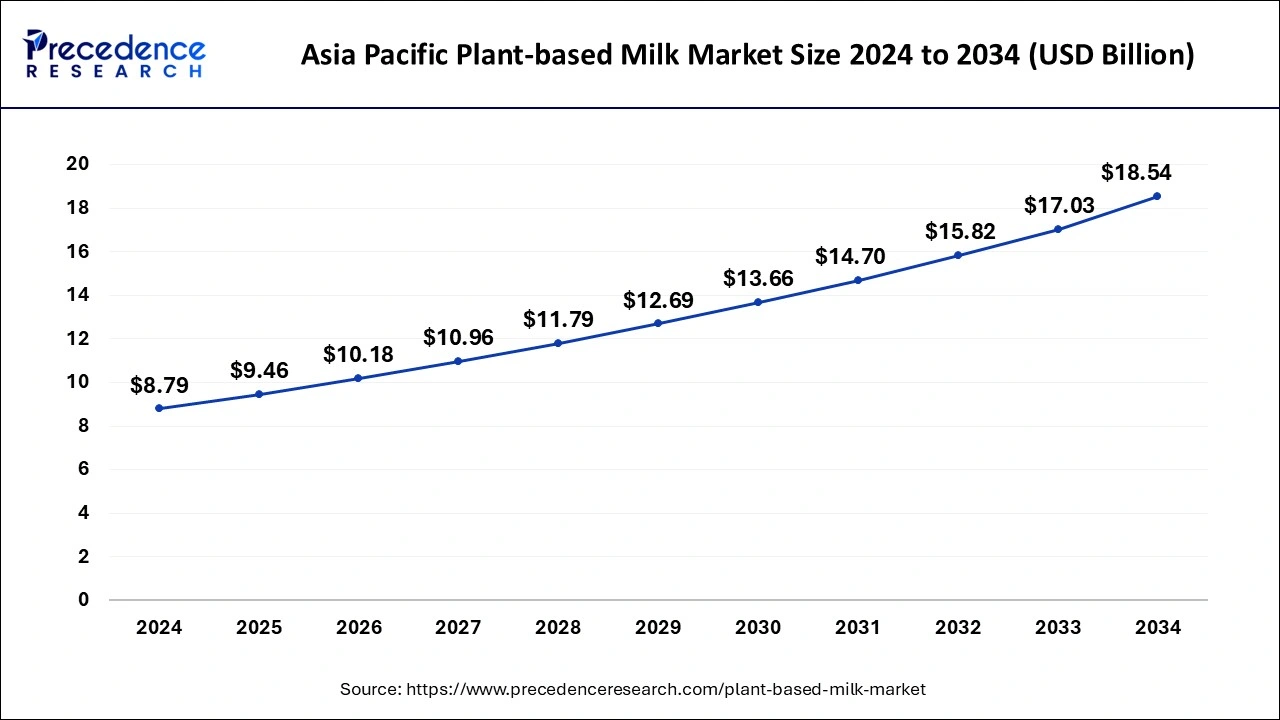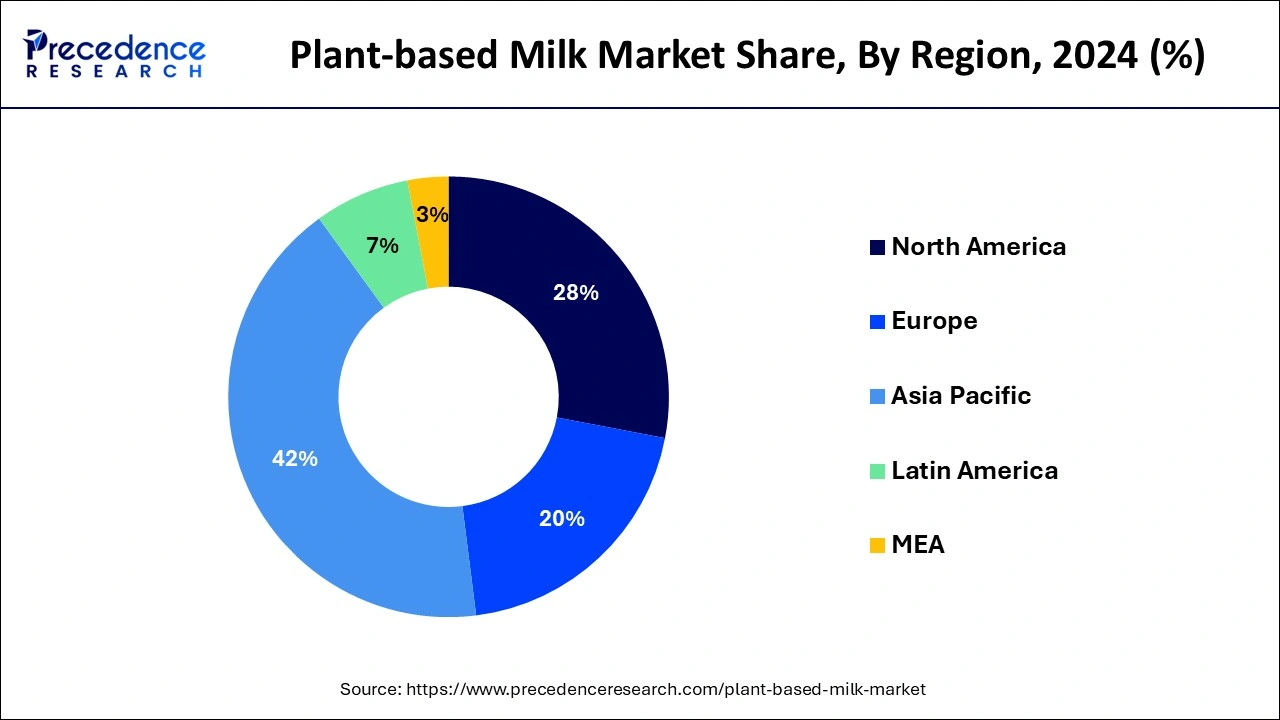January 2025
The global plant-based milk market size is estimated at USD 22.53 billion in 2025 and is predicted to reach around USD 43.63 billion by 2034, accelerating at a CAGR of 7.62% from 2025 to 2034. The Asia Pacific plant-based milk market size surpassed USD 9.46 billion in 2025 and is expanding at a CAGR of 7.75% during the forecast period. The market sizing and forecasts are revenue-based (USD Million/Billion), with 2024 as the base year.
The global plant-based milk market size was valued at USD 20.93 billion in 2024 and is anticipated to reach around USD 43.63 billion by 2034, expanding at a CAGR of 7.62% from 2025 to 2034. The rise in vegan and vegetarian lifestyles has contributed significantly to the demand for plant-based milk market. And thereby fuelling the plant-based milk market further over the forecast period globally.

Food & beverage manufacturing companies are increasingly using AI technologies to analyze market trends and consumer preferences. AI technologies also help manufacturers to develop specialized products based on the specific dietary requirements of consumers. Integrating AI technologies in manufacturing processes enhances production efficiency by reducing waste and human errors. They also improve the quality control process, ensuring the final product meets stringent safety and quality regulations set by regulatory agencies. AI-driven automation further contributes to sustainability. Furthermore, by utilizing AI technologies, food & beverage manufacturers can streamline the supply chain by managing inventory levels.
The Asia Pacific plant-based milk market size was estimated at USD 8.79 billion in 2024 and is anticipated to attain around USD 18.54 billion by 2034, expanding at a CAGR of 7.75% from 2025 to 2034.

Asia Pacific region dominated the global plant-based milk market in 2024. The region is observed to sustain the dominance throughout the forecast period. Owing to the increase in demand for lactose-free milk and less fatty milk products as a regime of healthy lifestyle among several people in urban cities. India, China, Taiwan, and Singapore are some of the leading countries and, thus, major market contributors in the market.
The raw source materials like soy, almond and rice are abundantly available in the Asian region will further propel the markets growth. The most demanding milk is soy, hemp, coconut, and almond milk. All these milks are widely available in the regional market because of the increasing demand from people. The rising awareness of vegan products and avoiding dairy products will further boost the plant-based milk market growth on a larger scale in the food and beverage industry throughout Asia Pacific.

North America is the second-largest region globally for plant milk. North America is a significant and most influential market for plant-based milk, with substantial growth and consumer adoption across the globe. Plant-based milk alternatives have become mainstream, appealing to vegans and a broader consumer base. For instance, in the United States, nearly three billion dollars in revenue is generated annually due to the surge of plant-based milk.
As health awareness increases, the country is witnessing a sudden spur for plant-based milk and its product as a dairy alternative. This is part of trends in the USA, which is declared by eating and nutrition trends. It shows a forecast by the USA Department of Agriculture that shows consumers' eating habits and preferences. High demand for plant-based milk can also be the reason for increasing lactose intolerance and general awareness of healthy eating habits.
The plant-based milk market has experienced significant growth in recent times. It is driven by increasing consumer demand for a healthy lifestyle and more variety of food that is sustainable in nature and gives immense nutrients. Plant-based milk is generally derived from the plant sources like soy, almond, rice, oats, coconut, etc. It offers a great optional value for traditional dairy milk from animals, which contains lactose content that may trigger cholesterol-related issues and harmful ingredients if it is contaminated with other chemicals that increase milk production in animals.
Unlike tastes, plant-based milk is quite similar to animal milk in terms of base appearance, usage, and texture. Innovation in product development and manufacturing processes has also levelled up with various techniques that do not squeeze vital nutrients from plant-based milk. For instance, soy milk and almond milk have gained popularity as beverages for their rich source of protein. It has been used since ancient times in Indian food culture.
| Report Coverage | Details |
| Growth Rate from 2025 to 2034 | CAGR of 7.62% |
| Global Market Size in 2025 | USD 22.53 Billion |
| Global Market Size by 2034 | USD 43.63 Billion |
| Largest Market | Asia Pacific |
| Base Year | 2024 |
| Forecast Period | 2025 to 2034 |
| Segments Covered | By Milk Type, By Distribution Channel, and By End-user |
| Regions Covered | North America, Europe, Asia-Pacific, Latin America, and Middle East & Africa |
Growing number of individuals opting for vegetarian diet
One of the major drivers for the plant-based milk market is the increasing popularity of vegan and plant-based diets, as they are more convenient for the human digestive tract to digest and absorb. For health-conscious consumers, ethical values regarding animal welfare are supreme for their lifestyle. For this reason, they are more prone to make plant-based food choices than dairy products to promote a healthy environment for the planet. Also, allergies to dairy products have seen an upsurge over the past years, leading to the consumption and development of plant-based milk as a better alternative. Various kinds of milk are available for different people and their demands, such as soy, almond, coconut, oat, etc.
These milks offer a safer choice for people who are lactose intolerant and susceptible to allergies due to animal-based dairy products. Also, trends on social media about plant-based milk have gained popularity and influenced many people's diet habits. As mentioned, several health benefits and the antioxidant properties of plant-based milk are more important for reversing aging or slowing the aging process in humans. All these marketing tactics go very well to drive the further growth of the plant-based milk market globally.
Processing level of plant-based milk is rising health concern.
Many plant-based milk products undergo over-processing and contain preservatives to extend their shelf life and mimic the taste and texture of dairy milk to attract consumers who are more prone to using dairy milk products. Because the inconsistency of plant-based milk compared to dairy milk is more noticeable. To overcome this, plant-based milk consists of additives, which may be the reason for concern regarding its health implications on the human system. Higher processing levels can reduce nutritional values and leave only Fiber content in it.
Also, plant-based milk and its products are primarily wrapped in a plastic cover, which is also an area of concern as plastic is nearly impossible to degrade and thereby harmful to the ecosystem of the earth. Such concerns are relatable and essential to consider. Hence, this can hinder the growth of the plant-based milk market.
Innovative product diversification
While soy analmond milk have dominated the plant-based milk market, there’s a lot more potential for diversification in this market. Because Consumers are increasingly seeking variety in flavours along with nutritional benefits beyond the traditional traits, to achieve this, distributors of plant-based milk products need to incorporate Innovations in achieving creamy textures without solely depending upon fat content to attract a broader consumer base. Also, infusing plant-based milk with natural flavours can create exciting options for different consumers. Research and development can focus on lesser-known plant sources such as oats, flaxseed, quinoa, etc.
These ingredients offer unique tastes and nutritional benefits as well. Additionally, incorporating functional additives like probiotics and prebiotics is vital to life. It can enhance the health appeal of plant-based milk among health-conscious people across the globe, and it will create immense opportunities to proliferate the plant-based milk market.
The soymilk segment dominated the market share in 2024. Soy milk is naturally resistant to allergens like lactose and dairy products. For people with lactose intolerance, soymilk is the best and most convenient option as it is available widely nowadays. Such a rising prevalence of lactose intolerance is increasing the demand for the soymilk segment. Also, plant-based diets and vegan trends have spurred the world widely due to the benefits that plant-based milk provides. Soymilk production requires less natural resources like water and land, and therefore, it generates lower greenhouse emissions than dairy production. All these factors are propelling the soymilk segment in the plant-based milk market globally.
The supermarket segment has dominated the plant-based milk market based on distribution channels in 2024. The segment is observed to sustain the position throughout the forecast period in response to the higher demand from the industry, supermarkets offer various brands of plant milk markets. This is to ensure a diverse range of options, including flavours and different formulations as per consumers' needs, can be available easily on their shelves.
Such ease of availability encourages consumers to repeatedly purchase from the same shops or supermarkets owing to the availability of a wide range of products at the same place. Moreover, supermarkets play an important role in marketing plant-based milk products and promoting them as a healthy diet option. They mainly highlight the benefits and contains of the product to maintain transparency throughout. Such an effort raises awareness of the masses and drives frequent purchasing from the same store.
The retail/household segment dominated the global plant-based milk market. Increasing awareness about health and wellness has impacted the masses over the past years and drives plant-based milk products. That is why many people adopt a plant-based diet.
Plant-based milk is often perceived as a healthy alternative to dairy products as it contains less saturated fats and fewer calories. It also increases awareness about the impact of animal agriculture, water use, and greenhouse emissions fuelling the plant-based milk market.
By Milk Type
By Distribution Channel
By End-user
By Geography
For inquiries regarding discounts, bulk purchases, or customization requests, please contact us at sales@precedenceresearch.com
No cookie-cutter, only authentic analysis – take the 1st step to become a Precedence Research client
January 2025
November 2024
February 2025
September 2024